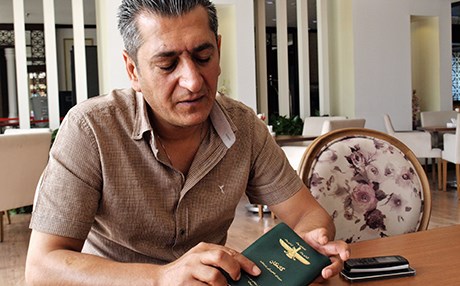
After over a millennium, the Zoroastrian faith is returning to its original habitat. The Ministry of Religion in the Iraqi Kurdistan capital Erbil has registered the religion, locally known as Zardashti, and suggested to the Kurdish government the ancient faith should be given its own directorate general and its believers be allowed to build new temples.
“Now it’s time,” says Nouri Sharif, one of the initiators of the movement that established a Zoroastrian organization in Europe in 2006 and in March announced in Erbil its official return to Kurdistan. In April, a Supreme Council of Zoroastrians in Kurdistan was founded.
Already active in Iran and India, the movement claims to have some 100,000 followers in Iraqi Kurdistan. This is mainly a reaction to the violence committed by the Islamic State, according to Sharif during an interview in a café in Kurdistan’s second city Sulaimani.
“People see something is imposed on them. They have witnessed suffering from another belief. Now it is the time for our destiny, because we are exhausted. We haven’t seen any good deeds from Daesh, it only gives us death and violence,” he said using Daesh, the Arabic acronym for ISIS.
Zoroastrians follow Zoroaster, also known as Zarathustra or locally as Zardasht, who probably lived in the 6th century BC. He was not a prophet like those known in Islam and Christianity, Sharif stressed.
“He was not sent by God as his representative. He was contemplating existence and the universe. Zardasht was a human being full of wisdom. For me he is a prophet, but he brings a philosophy he found himself,” he said.
He pointed to the little green book in front of him on the table. “This book is a summary of his thoughts. A hundred questions that he raised on existence, religion, God and the universe. It’s not God’s word, but that of humans,” Sharif continued.
Sharif returned five years ago to Sulaimani from Germany to start work on bringing back the religion to Kurdistan, and printed a selection of thoughts to be used for this task. They are taken from the main book of the faith, Avesta.
“Zardasht was one of the first to have called for worshipping one god, the Ahura Mazda… creator of existence,” he said.
An important aspect for attracting people to the faith is the fact that its founder was a Kurd. Not a lot is known about him, Sharif said, apart from that he was born in Urmia (now Iran) and died aged 77 in a fight. “During his life there was opposition,” Sharif said. “Later we were conquered by Alexander the Great, but we regrouped after that, until the total Islamic conquest.”
Already the Zoroastrians have centers in India and in Kerman in Iran.
“We plan to open a third one in Sulaimani. Seminars were held in different towns across Kurdistan, where many people participated,” Sharif said. “Amongst Kurds there is a great level of enthusiasm to go back to the roots; from various levels in the community; professors, politicians and normal people. Hundreds of thousands are interested and this is increasing.”
Sharif said councils have been established in the big cities, but his group is waiting for the licensing process to finish so it can open a center for people to visit.
Temples will be opened too, or in the vocabulary of the faith “attashga,” which means fire house, as fire is considered holy.
“They should be opened on the original locations, like in Darbandighan, Shaklawa, Soran, Chami Rezan, Qishqapan—the king that was buried there was a Zardashti,” Sharif claimed. “We have history to guide us, and will renovate old places.”
But for the moment the group is focused on culture and heritage. “We don’t want to start with the commitments of the religion, binding people to a certain number of prayers per day,” he said.
Even though reviving this pre-Islamic religion and convincing people to leave Islam might enrage Muslims who consider this to be prohibited, Sharif and his group have decided to work out in the open.
“Kurdistan has passed the era of secret practice. We follow the rules and legislations. If we are supported by law, hopefully it will protect us. All the religions have the right to call for worship,” he said.
Even so he knows it could be dangerous.
“We have made our decision, and this cause demands sacrifices. They can only kill and commit violence,” Sharif said referring to Muslim radicals like ISIS. “They could bring arguments, but they do not have the wisdom, that’s why they resort to killing. We are not afraid of them. Their religion is backward.”
Sharif expects that even though the vast majority of Kurds are Muslim, they can live together in peace. “We believe in peaceful coexistence. There is no violence in the origin of our culture. This is another wisdom by Zardasht, who says: ‘I will not draw my sword in troubled times, but light a candle.’”
http://rudaw.net/english/kurdistan/020620153
